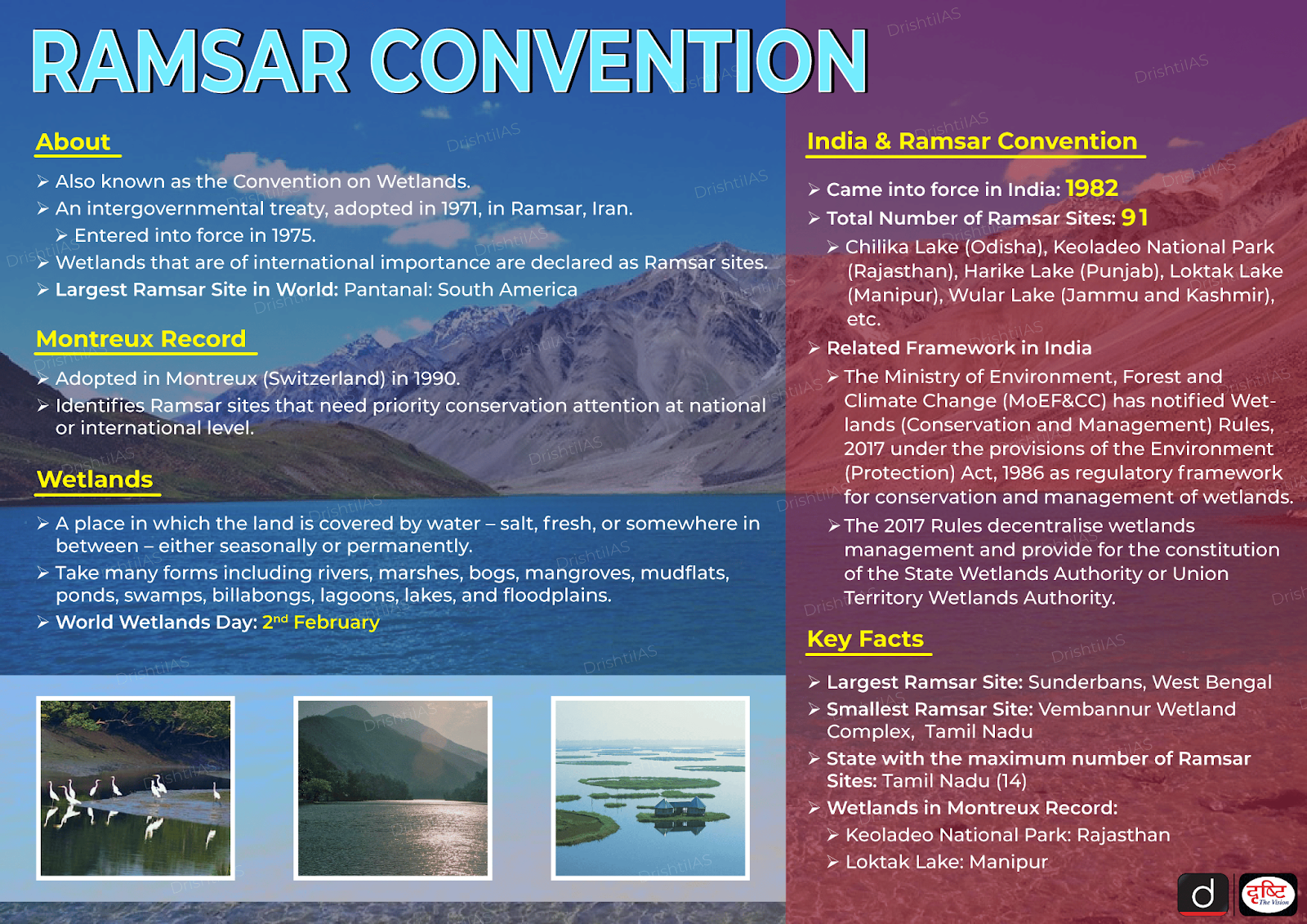Rajasthan
Ramsar Sites & World Environment Day
- 05 Jun 2025
- 5 min read
Why in News?
On World Environment Day, India added two more wetlands—Khichan in Phalodi and Menar in Udaipur—to the Ramsar List of Wetlands of International Importance.
- These additions increased the total number of Ramsar Sites in India to 91.
World Environment Day (WED)
- About & History:
- World Environment Day was established in 1972 during the United Nations Conference on the Human Environment held in Stockholm.
- Later that year, the UN General Assembly officially designated June 5 as World Environment Day.
- The first celebration took place in 1973 with the theme “Only One Earth,” marking the beginning of what would become the largest global platform for environmental awareness.
- WED celebration in 2021 started the UN Decade on Ecosystem Restoration (2021-2030) which is a global mission to revive billions of hectares, from forests to farmlands, from the top of mountains to the depth of the seas.
- World Environment Day was established in 1972 during the United Nations Conference on the Human Environment held in Stockholm.
- WED 2025:
- The Republic of Korea will host World Environment Day 2025 with a focus on ending plastic pollution globally.
- The theme for 2025 is “ Beat Plastic Pollution," a global focus on reducing plastic waste.
- India hosted the 45th celebration of World Environment Day in 2018 under the theme ‘Beat Plastic Pollution’
Key Points
- Khichan Wetland:
-
About:
- It is situated in the village of Khichan, approximately 171 km from Jaisalmer city, Rajasthan.
- It comprises two water bodies, Ratri river and Vijaysagar pond, riparian habitat and scrub land.
- Migratory Bird Habitat:
- The sanctuary hosts three migratory bird species: Kurjan, Karkara, and Kunch, locally known names for Demoiselle Cranes.
- Khichan Bird Sanctuary is globally renowned as the "Demoiselle Crane Village", attracting bird watchers and researchers from around the world.
- These birds migrate to Khichan from regions such as Southwest Europe, the Black Sea, Poland, Ukraine, Kazakhstan, Mongolia, and parts of North and South Africa.
- The sanctuary hosts three migratory bird species: Kurjan, Karkara, and Kunch, locally known names for Demoiselle Cranes.
-
- Menar Wetland:
-
About:
- Menar Wetland is a freshwater monsoon wetland complex located in Udaipur, Rajasthan.
- The wetland is formed by three interconnected ponds—Braham Talab, Dhand Talab, and Kheroda Talab—along with the agricultural land that links Dhand and Kheroda.
- During the monsoon season, the surrounding farmland floods, creating additional habitat for water bird species.
- Biodiversity and Key Species:
- The site supports a variety of birdlife, including the critically endangered white-rumped vulture (Gyps bengalensis) and long-billed vulture (Gyps indicus).
- It also harbours over 70 plant species, including mango trees (Mangifera indica) near Braham Talab.
- The mango trees serve as roosting sites for a large colony of Indian flying foxes (Pteropus giganteus), adding to the wetland’s ecological richness.
- Model of Community-Led Conservation:
- It is considered one of the finest examples of community-driven conservation in Rajasthan.
- Residents of Menar village play a crucial role in protecting wildlife, actively working to prevent poaching and fishing in the area.
-
- Ramsar Convention
-
About:
- The Ramsar Convention is an international treaty signed in 1971 in Ramsar, Iran, under the auspices of UNESCO, aimed at conserving wetlands of international importance.
- In India, it came into force on 1st February 1982, under which wetlands of international importance are declared as Ramsar sites.
- As of August 2024, Tamil Nadu (18) has the highest number of Ramsar sites, followed by Uttar Pradesh (10).
- Montreux Record is a register of wetland sites of International Importance where changes in ecological character have occurred, are occurring, or are likely to occur as a result of technological developments, pollution or other human interference.
- It is maintained as part of the Ramsar List.
- The Ramsar Convention is an international treaty signed in 1971 in Ramsar, Iran, under the auspices of UNESCO, aimed at conserving wetlands of international importance.
- Criteria for Identifying Ramsar Sites:
- Currently, there are nine criteria for identifying Wetlands of International Importance, which include sites containing representative, rare or unique wetland types; sites of international importance for conserving biological diversity; specific criteria based on waterbirds, fish, etc.
-



.jpg)




